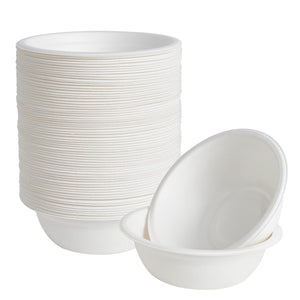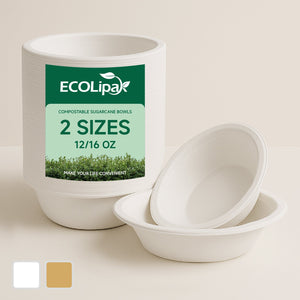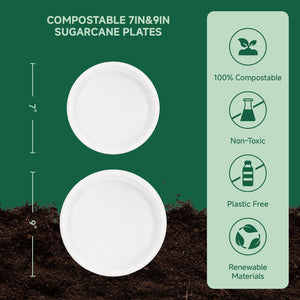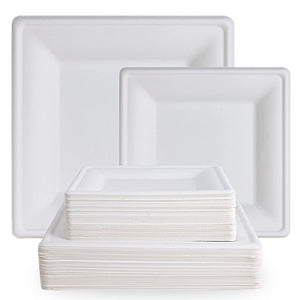Looking for the best disposable soup bowls for healthy living in 2025? You have great options that are both compostable and safe for you and the planet. Ecolipak’s Compostable Sugarcane Wide-rimmed Bowls lead the way with their sturdy design and eco-friendly materials. Many families and event planners love how easy these bowls make cleanup without harming the environment. Here’s a quick look at some popular choices:
|
Manufacturer |
Specialty |
Certifications |
|---|---|---|
|
Ecolipak |
Sugarcane wide-rimmed compostable bowls |
Compostable, BPA Free |
|
Eco-Products® |
PLA-lined bagasse bowls |
BPI, ASTM D6400 |
|
Bioleader® |
Bagasse-based compostable bowls |
BPI, FDA, FSC, EN13432 |
|
Biopak |
Sugarcane and PLA-lined packaging |
BPI, FSC, EN13432 |
|
Vegware |
PLA-lined paper and bagasse containers |
BPI, OK Compost, TUV Austria |
Choosing safe, convenient, and earth-friendly bowls helps you enjoy every meal while caring for the world around you.
Key Takeaways
-
Choose compostable soup bowls to protect your family's health. They avoid harmful chemicals found in traditional plastic bowls.
-
Compostable bowls break down naturally, reducing landfill waste and helping the environment. They decompose much faster than plastic.
-
Look for certifications like BPI or ASTM D6400 when buying bowls. These labels ensure the product is safe and eco-friendly.
-
Ecolipak's sugarcane bowls are sturdy and leak-resistant, making them perfect for hot soups and easy cleanup.
-
Using compostable bowls supports a sustainable lifestyle. You help reduce pollution and protect wildlife with every meal.
Why Compostable Bowls?
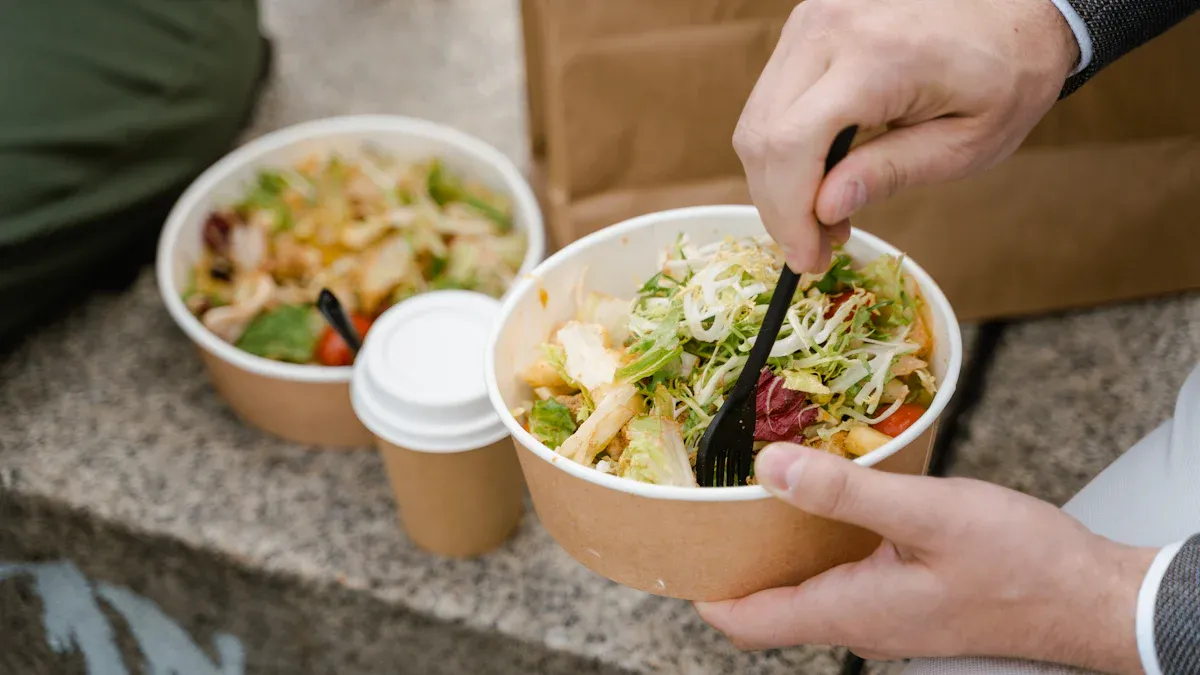
Health Benefits
You want to keep your family safe at every meal. Compostable bowls help you do just that. Many traditional disposable bowls use materials like polystyrene or plastics. These can release harmful chemicals, especially when you pour in hot soup. Some of the most common health risks from non-compostable bowls include:
-
Polystyrene, which experts have linked to cancer.
-
PFAS, sometimes called “forever chemicals,” that can disrupt your thyroid and increase cancer risk.
-
Heavy metals, which may leach into your food and harm your health.
-
Phthalates, which can affect hormones and have been linked to breast cancer.
When you choose compostable bowls made from natural materials, you avoid these risks. Ecolipak’s mission is to give you peace of mind with products that are both safe and biodegradable. Many customers say they feel better knowing their soup bowls do not contain hidden toxins. You get sturdy, reliable bowls without worrying about what might be leaching into your food.
Environmental Impact
You care about the planet and want to make choices that matter. Compostable and biodegradable bowls break down naturally, so they do not add to landfill waste. Unlike plastic bowls, which can take hundreds of years to decompose, compostable bowls return to the earth quickly. Here’s how they compare:
|
Metric |
Compostable Bowls |
Plastic Bowls |
|---|---|---|
|
Carbon Emissions |
Lower |
Up to 2.5x higher |
|
Compostability |
Yes |
No |
|
End-of-life Impact |
Reduces methane |
Microplastic pollution |
Ecolipak has already helped protect thousands of square meters of green space by offering eco-friendly options. When you use compostable bowls, you join a growing community of people who want to make a real difference. You help reduce pollution, protect wildlife, and keep your environment clean for future generations.
Features
Materials
You want a soup bowl that’s safe for your family and gentle on the planet. Most compostable bowls use plant-based materials that break down naturally. Ecolipak’s Compostable Sugarcane Wide-rimmed Bowls use sugarcane bagasse, a renewable resource left over after juice extraction. This material is sturdy and leak-resistant, so you can serve hot soups without worry. Here’s a quick look at common materials and their benefits:
|
Material Type |
Environmental Advantages |
Pros and Cons |
|---|---|---|
|
Paper-based bowls |
Recyclable, not always compostable |
Lightweight, inexpensive; may not hold up with liquids |
|
Plant fiber bowls |
Renewable, fully compostable |
Compostable, sturdy, microwave-safe; can soften with long liquid exposure |
|
Bagasse (Sugarcane) |
Compostable, biodegradable, made from sugarcane residue |
Sturdy, leak-resistant; slightly higher cost |
|
Bamboo fiber bowls |
Strong, compostable, fast-growing resource |
Durable, ideal for hot/cold foods; more expensive, less common |
|
Biodegradable polymers |
Plant-based, compostable under certain conditions |
Performs like plastic, lower impact; needs industrial composting |
You get peace of mind knowing your bowl supports a cleaner world.
Certifications
Certifications help you trust what you’re buying. Ecolipak’s bowls meet strict standards for compostability and safety. When you see labels like BPI, EN13432, or ASTM D6400, you know the product will break down in composting facilities and won’t leave harmful residues. Here are some top organizations and what their certifications mean:
|
Organization |
Certification Details |
|---|---|
|
Biodegradable Products Institute (BPI) |
BPI Certified Compostable products meet strict standards for compostability. |
|
TÜV Austria |
Performs compostability certifications based on the European standard EN 13432. |
|
Compost Manufacturing Alliance |
Ensures products meet ASTM lab standards through lab and field tests. |
Look for these marks when you shop. They show you’re making a safe and responsible choice.
Leak Resistance
No one likes a soggy bowl or a messy table. Compostable bowls like Ecolipak’s use molded fibers that resist leaks, even with oily or acidic soups. The manufacturing process creates a tight network of fibers, keeping moisture out and your food in. You can serve chili, stew, or broth without worrying about spills. Many families say these bowls hold up better than regular paper bowls.
-
Molded fiber bowls are soak-proof.
-
The fiber network resists moisture and prevents leaks.
Heat Tolerance
You want a bowl that stands up to hot soup. Compostable sugarcane bowls can handle temperatures up to 220°F. You can microwave leftovers or serve steaming meals without the bowl losing shape. Ecolipak’s bowls are microwave and freezer safe, so you get flexibility for every meal. This heat tolerance means you can enjoy hot soups and stews with confidence.
Tip: Always check the label for heat resistance before using any disposable bowl for hot foods.
Best Compostable Disposable Bowl Picks
Choosing the best disposable soup bowls for healthy living in 2025 feels easy when you know what to look for. You want bowls that keep your food safe, protect the planet, and make cleanup simple. Let’s explore the top picks that families and event planners love.
Ecolipak Sugarcane Wide-rimmed Bowls
You want a bowl that checks every box. Ecolipak’s Compostable Sugarcane Wide-rimmed Bowls stand out as the best disposable soup bowls for 2025. These bagasse bowls use sugarcane fibers left over from juice extraction. You get molded fiber bowls that feel sturdy in your hands and never leak, even with hot soup.
Ecolipak’s molded fiber bowls come in two sizes, 12 oz and 16 oz, so you can serve anything from a light broth to a hearty stew. The wide rim makes it easy for kids and adults to hold. You can microwave leftovers or freeze extra soup without worry. These bagasse bowls break down naturally, leaving no harmful residue. You help protect green spaces every time you use them.
Families say these molded fiber bowls make parties and weeknight dinners stress-free. You don’t need to worry about chemicals like PFAS or BPA. Ecolipak’s compostable disposable bowl is certified compostable and BPA-free, so you know you’re making a safe choice.
You can find these bagasse bowls on Ecolipak’s official website or go straight to the product page for more details.
Here’s a quick look at what makes Ecolipak’s molded fiber bowls special:
|
Feature/Certification |
Description |
|---|---|
|
Compostable |
Breaks down into organic material, leaving no toxins |
|
Bagasse bowls |
Made from renewable sugarcane fibers |
|
Molded fiber bowls |
Leak-resistant, sturdy, and microwave safe |
|
No Added PFAS |
Meets composting and state regulations |
|
BPA Free |
Safe for your family |
|
Freezer Safe |
Perfect for storing leftovers |
|
Certified by trusted organizations |
|
|
Wide Rim |
Easy to grip and serve |
You get peace of mind and a cleaner kitchen. Ecolipak’s molded fiber bowls help you live greener every day.
Other Compostable Bowls
You have more choices for the best disposable soup bowls. Many brands offer molded fiber bowls, bagasse bowls, and palm leaf bowls. These compostable bowls use plant-based materials and meet strict safety standards. You might see kraft paper soup bowls at your local store. They work well for takeout and feel eco-friendly.
Let’s compare some popular options:
|
Product Type |
Advantages |
|---|---|
|
Molded fiber bowls |
Sturdy, leak-proof, compostable |
|
Bagasse bowls |
Made from sugarcane, strong, compostable |
|
Palm leaf bowls |
Unique look, compostable, great for parties |
|
Kraft paper soup bowls |
Good for takeaway, eco-friendly |
Palm leaf bowls add a natural touch to your table. You can use molded fiber bowls for hot or cold foods. Bagasse bowls work for everyday meals and special events. Kraft paper soup bowls make takeout easy and safe.
You want to check for certifications like BPI, CMA, and FSC. These marks show the molded fiber bowls and bagasse bowls meet composting standards. You get compostable bowls that break down quickly and leave no waste.
Biodegradable Options
You might wonder how biodegradable bowls compare to compostable bowls. Both help the environment, but they work a little differently. Biodegradable bowls break down in 60 to 180 days under composting conditions. Compostable bowls meet strict standards and turn into nutrient-rich compost.
Here’s a simple table to help you see the difference:
|
Aspect |
Biodegradable |
Compostable |
|---|---|---|
|
Decomposition Time |
60 to 180 days |
Meets set composting timeframe |
|
Environmental Impact |
Breaks down naturally |
Leaves nutrient-rich compost |
|
Residue |
May not enrich soil |
No toxic residue |
You can choose molded fiber bowls, bagasse bowls, or palm leaf bowls that are biodegradable. These bowls help you reduce waste and support a cleaner planet. Compostable bowls give you extra peace of mind because they leave behind healthy soil.
Tip: Always check the label for “compostable” or “biodegradable” before you buy. You want the best disposable soup bowls for your family and the earth.
Palm leaf bowls, molded fiber bowls, and bagasse bowls all make great choices for healthy living. You get convenience, safety, and sustainability in every meal.
Choosing Your Bowl
Lifestyle Fit
You want your soup bowl to match your daily routine. Start by checking what the bowl is made from. Sugarcane and palm leaf bowls feel sturdy and safe. Look for certifications on the packaging. These marks show the bowl is truly eco-friendly and not just a marketing trick. Make sure you know how to dispose of the bowl. Some bowls break down in your backyard compost, while others need an industrial facility. Always pick bowls free from toxins. Your health matters. Choose the right size for your needs. Ecolipak offers bowls in several sizes, so you can find one for a quick snack or a big meal.
Tip: If you care about the planet, choose compostable bowls made from plant fibers. You help create a sustainable kitchen and keep your family safe.
Event Use
Every event has different needs. You might host a birthday party, a picnic, or a work lunch. Ecolipak’s bowls fit all occasions. Restaurants use them for dine-in and take-out. Caterers love them for large gatherings. Food trucks and street vendors pick them for easy serving. Home parties become easier with disposable bowls that look good and clean up fast.
-
Restaurants: Green choice for serving soup.
-
Catering: No mess, no waste.
-
Food trucks: Quick and safe for busy crowds.
-
Home parties: Simple cleanup, stylish look.
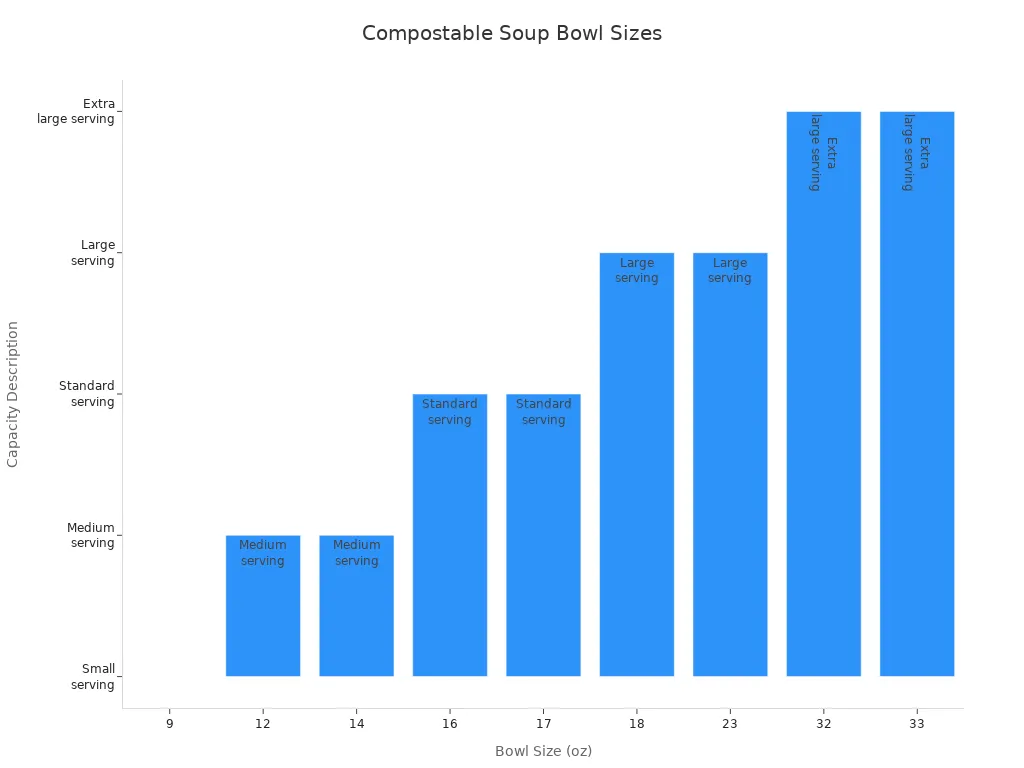
Dietary Needs
You want a bowl that fits your meal. Ecolipak’s bowls come in nine sizes, from small to extra large. You can serve a light broth or a hearty stew. Custom options let you match the bowl to your diet. If you need a small portion, pick a 9 oz bowl. For big servings, try a 32 oz or 33 oz bowl. Here’s a quick guide:
|
Size (oz) |
Capacity Description |
|---|---|
|
9 |
Small serving |
|
12 |
Medium serving |
|
14 |
Medium serving |
|
16 |
Standard serving |
|
17 |
Standard serving |
|
18 |
Large serving |
|
23 |
Large serving |
|
32 |
Extra large serving |
|
33 |
Extra large serving |
You get flexibility for every meal. Ecolipak’s bowls help you serve healthy food in a way that fits your life.
Where to Buy Compostable Bowls
Finding the right place to buy eco-friendly soup bowls can make your life easier and greener. You have several great options, whether you like shopping online or prefer picking things up in person.
Online Retailers
Shopping online gives you lots of choices and saves you time. Many trusted websites offer compostable soup bowls that fit your needs. Here are some popular places to look:
-
Good Start Packaging: You can find a wide range of soup bowls made from sustainable materials. Their bowls hold up well with hot liquids, so you don’t have to worry about leaks. They offer free samples if you want to try before you buy. If you order more than $50, shipping is free. Bulk pricing helps you save money, especially if you host big events or run a business.
-
Amazon: You can browse many brands and read reviews from other buyers. Fast shipping and easy returns make it a favorite for many families.
-
Eco-Products® and Vegware: These brands have their own online stores. You can find different sizes and styles for every occasion.
Tip: Always check for certifications and read product details before you buy. This helps you pick the safest and most earth-friendly bowls.
Local Stores
Sometimes you want to see and touch the bowls before buying. Many grocery stores and big-box retailers now carry eco-friendly tableware. Look for compostable soup bowls in the party supply or kitchenware aisle. Stores like Whole Foods, Target, and local co-ops often stock these products. You might even find special deals or seasonal discounts.
If you support small businesses, check out local zero-waste shops or specialty food stores. Staff can answer your questions and help you choose the best option for your family or event.
Ecolipak Website
For the best experience, visit the Ecolipak official website. You get direct access to their full range of compostable sugarcane wide-rimmed bowls. The site makes it easy to pick the right size and color for your needs. If you buy in bulk, you save more per bowl. Ecolipak also offers a subscription plan, so you never run out of eco-friendly tableware. Subscribers enjoy a 15% discount, making it a smart choice for families and businesses who care about the planet.
Shopping directly from Ecolipak means you support a brand that puts the environment and your health first.
Disposal Tips
Composting at Home
You want to make sure your eco-friendly bowls break down the right way. Composting at home is simple if you follow a few steps:
-
Set up a compost bin for kitchen scraps and compostable items.
-
Mix brown materials, like dry leaves or cardboard, with green food waste.
-
Turn your compost pile often and keep it just a bit damp—think of a wrung-out sponge.
-
Always check that your bowls are certified for home composting. Some products only break down in industrial settings.
-
Place used bowls in your compost bin, not the trash. This helps them turn into healthy soil.
Tip: Ecolipak’s bowls are designed to break down naturally, so you can feel good about adding them to your home compost.
Industrial Composting
Sometimes you need a little help from the pros. Industrial composting facilities use special equipment and higher temperatures to break down items faster. Many cities now accept certified compostable bowls at these sites. Here’s what happens:
-
Facilities accept certified compostable products, including bioplastics and molded fiber bowls.
-
Machines shred and mix the waste, then heat it up to speed up decomposition.
-
Most bowls break down in two to six months, depending on the material.
If your city offers compost collection, just toss your used bowls in the right bin. You help create rich compost for parks and gardens.
Proper Use
You get the most out of your eco-friendly bowls when you use and dispose of them the right way:
-
Only use bowls for food, not for chemicals or non-food waste.
-
After eating, remove any large food scraps before composting.
-
Make sure you place bowls in a compost bin, not the regular trash.
-
If you’re at an event, look for compost bins or ask the host about disposal.
Many Ecolipak customers say they love how easy it is to compost their bowls after a meal. You help protect the planet and keep your kitchen clean at the same time.
You have great choices for healthy living in 2025. Compostable bowls and biodegradable options help you cut down on plastic and support a cleaner planet. Ecolipak leads the way with eco-friendly bowls that are safe, sturdy, and easy to use. Here’s what customers love:
|
What Customers Like |
Why It Matters |
|---|---|
|
Compostable bowls reduce waste |
Less pollution for everyone |
|
Biodegradable bowls are versatile |
Use them for any meal |
|
Microwave-safe and customizable |
Fits your busy lifestyle |
Choose compostable bowls for your next meal. You help your family and the earth at the same time.
FAQ
What makes compostable soup bowls better for environmental protection?
You help the planet when you pick bowls with natural composition. These bowls break down fast and do not harm wildlife. Upcycled sugarcane bagasse and cornstarch bio-plastic bowls offer strong sustainability. You make eco-friendly choices that lower environmental impact and support healthy living.
Can I use cornstarch bio-plastic bowls for hot soup?
Yes, you can! Cornstarch bio-plastic bowls handle heat well. Their natural composition keeps your food safe. You get sturdy bowls that do not leak. These bowls show strong sustainability credentials and help you reduce environmental concerns at every meal.
How do I know if a bowl is truly compostable?
Look for certifications like BPI or EN13432. These marks prove the bowl’s sustainability. You want bowls made from bagasse or cornstarch bio-plastic. Check the label for natural composition. Compostable bowls break down fast and do not leave harmful residue, lowering environmental impact.
Are bagasse bowls safe for my family and the environment?
Bagasse bowls come from upcycled sugarcane bagasse. You get bowls with natural composition and no toxins. These bowls protect your health and lower environmental impact. Families love how bagasse bowls support sustainability and make eco-friendly choices easy.
What should I do with used compostable bowls to maximize sustainability?
Place used bowls in your compost bin. You help create healthy soil and reduce environmental concerns. Compostable bowls with natural composition break down fast. You support sustainability and lower environmental impact every time you compost your bowls.




